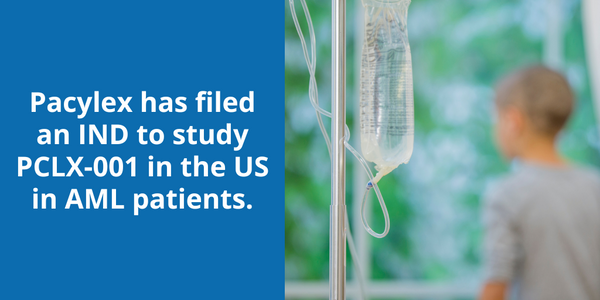Edmonton, Alberta, Canada, October 14, 2022 Pacylex today announced that the U.S. Food and Drug Administration (FDA) granted PCLX-001 Orphan Drug Designation for “treatment of patients with acute myeloid leukemia.” PCLX-001 is a first-in-class N-myristoylation inhibitor in clinical development by Pacylex. PCLX-001 is currently being studied in non-Hodgkin lymphoma (NHL) and solid tumor cancer patients at 4 sites in Canada. Pacylex has filed an IND to study PCLX-001 in the U.S. in AML patients.
Dr. Michael Weickert, Pacylex’s President and CEO commented, “The 5-year survival rate for AML patients 20 and older is only 27%. Patients relapse despite existing therapies. We are developing a first-in-class therapy that tackles AML in a new way that has been very effective in disease models and may be synergistic with other approaches. Our trial will offer relapsed patients another option. This Orphan Drug Designation for PCLX-001 recognizes the importance of this potential new therapy for these patients.”
The planned US study will be the first time an NMT inhibitor is tested in AML patients. The U.S. Department of Defense recently awarded a grant of $1.4 million to treat AML patients with PCLX-001. “Our ongoing clinical trial in people with NHL and solid tumors showed PCLX-001 was well-tolerated and achieved drug exposures likely to benefit AML patients,” said Dr. John Mackey, CMO of Pacylex. “We look forward to treating AML patients with PCLX-001 in the near future.”
In animal models of AML, PCLX-001 monotherapy produced complete remissions in subcutaneous AML cell line derived xenografts (CDXs). In tail-vein injected AML patient derived xenografts (PDXs), PCLX-001 treatment resulted in up to 95% reduction of human peripheral blood and bone marrow CD45+ cells, which include the malignant stem cell population responsible for disease relapse.
The ongoing clinical PCLX-001 trial in NHL and solid tumor patients is registered at ClinicalTrials.gov Identifier: NCT04836195.
The U.S. FDA Orphan Drug Designation is only granted to investigational therapies addressing medical diseases or conditions that affect fewer than 200,000 people in the United States. Orphan drug designation provides several benefits to drug developers, including assistance in the drug development process, tax credits for clinical costs, exemptions from certain FDA fees and seven years of post-approval marketing exclusivity.
PCLX-001 (aka DDD86481) is a first-in-class, small molecule NMT inhibitor originally developed by the University of Dundee Drug Discovery Unit as part of a program to treat African sleeping sickness, funded by Welcome Trust. Pacylex is developing PCLX-001 in the form of a once-a-day pill initially to treat leukemia and lymphoma. PCLX-001 has also been shown to inhibit the growth of lung and breast cancer tumors in animal models. In leukemia, lymphoma and breast cancer patients, the levels of NMT2 is correlated with survival, suggesting an important biological role in these cancers. In tests using cultured cancer cells in vitro, PCLX-001 is at least ten times as potent as ibrutinib (Imbruvica) and dasatinib (Sprycel), two clinically approved drugs currently used to treat hematologic malignancies.
Pacylex is a pharmaceutical company headquartered in Edmonton, Alberta, Canada, targeting hematologic and solid cancers with a new first-in-class therapeutic, PCLX-001. Pacylex’s technology combines new insights from Dr. Luc Berthiaume of the University of Alberta connecting myristoylation to cancer with a family of high quality myristoylation inhibitors Pacylex licensed from the University of Dundee. PCLX-001 is the lead drug in a new class of NMT inhibitors, enabling Pacylex to exploit NMTs as new clinical targets for cancer treatment. Pacylex initiated clinical studies in Canada in the fall of 2021 in non-Hodgkin lymphoma and solid tumors. Pacylex is also receiving support from an Alberta Innovates AICE grant in 2020, and the research leading to this breakthrough was supported in part by the Alberta Cancer Foundation and the Cure Cancer Foundation. The US Department of Defense is supporting initial clinical investigation of PCLX-001 in AML patients.







